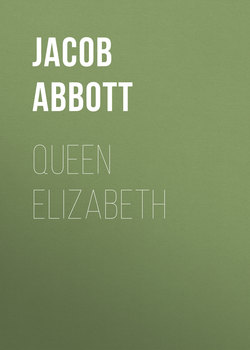Queen Elizabeth

Реклама. ООО «ЛитРес», ИНН: 7719571260.
Оглавление
Abbott Jacob. Queen Elizabeth
Chapter I. Elizabeth's Mother
Chapter II. The Childhood of a Princess
Chapter III. Lady Jane Grey
Chapter IV. The Spanish Match
Chapter V. Elizabeth in the Tower
Chapter VI. Accession to the Throne
Chapter VII. The War in Scotland
Chapter VIII. Elizabeth's Lovers
Chapter IX. Personal Character
Chapter X. The Invincible Armada
Chapter XI. The Earl of Essex
Chapter XII. The Conclusion
Отрывок из книги
Travelers, in ascending the Thames by the steamboat from Rotterdam, on their return from an excursion to the Rhine, have often their attention strongly attracted by what appears to be a splendid palace on the banks of the river at Greenwich. The edifice is not a palace, however, but a hospital, or, rather, a retreat where the worn out, maimed, and crippled veterans of the English navy spend the remnant of their days in comfort and peace, on pensions allowed them by the government in whose service they have spent their strength or lost their limbs. The magnificent buildings of the hospital stand on level land near the river. Behind them there is a beautiful park, which extends over the undulating and rising ground in the rear; and on the summit of one of the eminences there is the famous Greenwich Observatory, on the precision of whose quadrants and micrometers depend those calculations by which the navigation of the world is guided. The most unconcerned and careless spectator is interested in the manner in which the ships which throng the river all the way from Greenwich to London, "take their time" from this observatory before setting sail for distant seas. From the top of a cupola surmounting the edifice, a slender pole ascends, with a black ball upon it, so constructed as to slide up and down for a few feet upon the pole. When the hour of 12 M. approaches, the ball slowly rises to within a few inches of the top, warning the ship-masters in the river to be ready with their chronometers, to observe and note the precise instant of its fall. When a few seconds only remain of the time, the ball ascends the remainder of the distance by a very deliberate motion, and then drops suddenly when the instant arrives. The ships depart on their several destinations, and for months afterward when thousands of miles away they depend for their safety in dark and stormy nights, and among dangerous reefs and rocky shores, on the nice approximation to correctness in the note of time which this descending ball had given them.
This is Greenwich, as it exists at the present day. At the time when the events occurred which are to be related in this narrative, it was most known on account of a royal palace which was situated there. This palace was the residence of the then queen consort of England. The king reigning at that time was Henry the Eighth. He was an unprincipled and cruel tyrant, and the chief business of his life seemed to be selecting and marrying new queens, making room for each succeeding one by discarding, divorcing, or beheading her predecessor. There were six of them in all, and, with one exception, the history of each one is a distinct and separate, but dreadful tragedy. As there were so many of them, and they figured as queens each for so short a period, they are commonly designated in history by their personal family names, and even in these names there is a great similarity. There were three Catharines, two Annes, and a Jane. The only one who lived and died in peace, respected and beloved to the end, was the Jane.
.....
In this letter, she said that she was so distressed and bewildered by the king's displeasure and her imprisonment, that she hardly knew what to think or to say. She assured him that she had always been faithful and true to him, and begged that he would not cast an indelible stain upon her own fair fame and that of her innocent and helpless child by such unjust and groundless imputations. She begged him to let her have a fair trial by impartial persons, who would weigh the evidence against her in a just and equitable manner. She was sure that by this course her innocence would be established, and he himself, and all mankind would see that she had been most unjustly accused.
But if, on the other hand, she added, the king had determined on her destruction, in order to remove an obstacle in the way of his possession of a new object of love, she prayed that God would forgive him and all her enemies for so great a sin, and not call him to account for it at the last day. She urged him, at all events, to spare the lives of the four gentlemen who had been accused, as she assured him they were wholly innocent of the crime laid to their charge, begging him, if he had ever loved the name of Anne Boleyn, to grant this her last request. She signed her letter his "most loyal and ever faithful wife," and dated it from her "doleful prison in the Tower."
.....